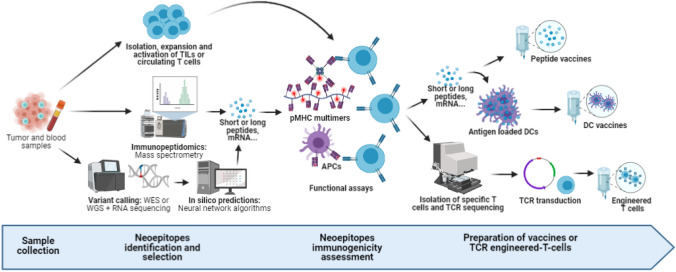Fig. 2.
Neoepitopes selection and use in adoptive therapies. Identification of immunogenic neoepitopes is a crucial step to creating personalized adoptive therapies. Several methods exist. Tumor and blood samples can be sequenced (through whole genome or whole exome sequencing) to identify variants specific to the tumor. Expression is then validated by RNA sequencing, and neural network algorithms are used to predict neoepitopes with the best avidity and stability for TCR recognition. Another way to identify these presented neoepitopes is through mass spectrometry of the tumor samples. Neoepitopes are then synthetized (mainly through the form of short peptides or mRNA) to be tested for immunogenicity. They are either presented by isolated autologous or haploidentical allogeneic antigen-presenting cells or by pMHC multimers to expanded T cells. Immunogenicity is evaluated by functional assays such as activation of co-stimulatory markers (4-1BB/CD137) or IFNγ secretion. Reactive T cells can then be isolated in order to sequence the specific TCR, which can then be transduced into effector cells before reinfusion into the patient. Neoepitopes can also be directly injected into the patient or pulsed into DCs to stimulate the adaptive response of the patient. Figure created with BioRender.com

